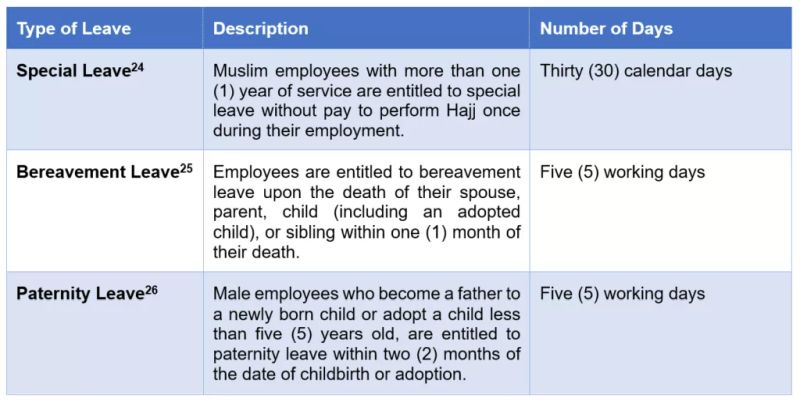- within Employment and HR topic(s)
- within Employment and HR topic(s)
- in European Union
- in European Union
- in European Union
- in European Union
- in European Union
- with readers working within the Chemicals and Media & Information industries
- within Tax, Government, Public Sector, Media, Telecoms, IT and Entertainment topic(s)
KEY TAKEAWAYS
- The ADGM Employment Regulations 2024, effective 1 April 2025, replace the 2019 framework and introduce modernised standards aligned with global practices.
- The definitions of "employer" and "employee" have been broadened to include part-time, remote, and flexible work arrangements.
- Written employment contracts are now mandatory, with clear minimum content requirements and strengthened employee entitlements.
- Leave benefits now accrue from the first day of employment.
- Employers face strict timelines and penalties for delayed final payments post-termination and must cancel visas promptly at no cost to the employee.
- Anti-discrimination protections have been expanded, with new provisions addressing victimisation and retaliation.
- Businesses in the ADGM must update their employment contracts and HR policies to ensure full compliance with the new Regulations.
The Abu Dhabi Global Market ("ADGM") has revamped its labour law with the introduction of the Employment Regulations 2024 ("Regulations") published on 3 January 2025, and effective as of 1 April 2025. In the background of the ADGM's expansion to Al Reem Island1 and its continuous growth in terms of operations 2, the ADGM has become a prominent financial free zone. With a strong workforce comes a strong responsibility to enforce a robust employment framework.
The Regulations repeal the previous Employment Regulations of 2019 and seek to align the ADGM's framework with contemporary workplace practices globally, while ensuring that both employers and employees within the ADGM have more defined rights and obligations under the law. This article explores the key changes and clarifications in the new regime.
Key Provisions of the Regulations
Who is an "employer" and an "employee"?
The definitions of "employer" and "employee" have been revised under the new Regulations.3 While an employer means any person incorporated, established, or registered in the ADGM (or the ADGM itself), the definition of "employee" has been widened significantly. An employee includes persons employed by an employer based within or ordinarily working within the ADGM. It may also mean any person agreeing to an employment contract to be subject to the Regulations. This leaves space for flexible work arrangements and remote workers to be covered under the new Regulations.
Part-Time and Remote Employment
The Regulations now provide specific definitions for part-time and remote employees. Part-time workers are entitled to the same pro-rated benefits and protections as full-time employees, but if they work every day of the working week, some entitlements under the Regulations (such as leaves and maternity benefits) cannot be prorated.4
By default, all remote employees are treated as employees under the Regulations and are entitled to all benefits, except those expressly excluded. All obligations of the employer with respect to the workplace, such as ventilation, workstations, sanitary conveniences, water, etc, are excluded for a remote employee.5 For a remote employee who resides in and works in the UAE, the employer must also obtain and maintain a work permit, visa, and UAE ID card for the remote employee as they would for any other employee working in the office.6
Contractual Requirements and Employment Terms
One of the most significant updates is the express requirement that all employment contracts must be in writing as a matter of the employee's right.7 The employer must serve the signed employment contract to the employee within one (1) month of the commencement of their employment. As a minimum, the employment contract must include the following information:8
- The names of the employer and employee;
- The date of commencement of the employment;
- The employee's job title;
- The employee's wages;
- The applicable pay period;
- Terms and conditions relating to hours or days of work, vacation leave and sick leave;
- The length of notice period required for termination of the employment contract;
- The duration of the employment contract (where it is not intended to be for an indefinite period;
- The employee's place of work;
- A reference to the disciplinary rules or procedures applicable to the employee; and
- An explicit confirmation that the laws of the ADGM will govern the employment contract.
Employers are also responsible for obtaining, maintaining, and paying for their employees' work permits, visas, and UAE ID cards.9 The employer may not seek reimbursement for obtaining the visa. Upon termination of employment, the employer must cancel the work permit and visa within a reasonably practicable period without imposing any costs or conditions on the employee.10
Rights of the Employee
Certain explicit rights have been introduced in the Regulations to protect the employee:
- The right to an employment contract (as detailed above);
- The right to a pay statement, detailing the amount of wages payable to the employee and the amount of any deductions from the wages;11
- The right to a written statement of reasons for termination (to be provided within twenty-one (21) days of request);12 and
- The right to an employment reference (to be provided within twenty-one (21) days of request).13
Working Time and Overtime
The maximum working hours of an employee, which are forty-eight (48) hours, remain unchanged, but their entitlement to overtime pay remains subject to rules or guidelines issued by the Registrar, which are pending issuance.14 By removing provisions relating to overtime, the entitlement is left to the employer and employee to negotiate and agree upon until the Registrar issues rules. Any overtime work must only be undertaken after the employee has written consent. During Ramadan, Muslim employees will be entitled to have their working hours reduced by twenty-five (25%) each day, with no corresponding reduction in wages.15
Leave Entitlements
Vacation Leave: While the entitlement to annual vacation leave remains twenty (20) working days minimum paid vacation leave, the accrual of vacation leave is no longer subject to a minimum service period of ninety (90) days.16 Vacation leave entitlements begin from the first day of employment, with 1/12th of their annual entitlement accruing on the first day.17
Sick Leave: Employees are entitled to sixty (60) working days of sick leave,18 with sick pay of one hundred percent (100%) of the daily wage for the first ten (10) working days, fifty percent (50%) of the daily wage for the next twenty (20) working days, and zero pay for the remaining thirty (30) working days.19 However, similar to vacation leave, sick leave also accrues from the first day of employment.
Maternity Leave: Female employees are entitled to sixty-five (65) working days of maternity leave, with maternity pay of one hundred percent (100%) of the daily wage for the first thirty-three (33) working days and fifty percent (50%) of the daily wage for the next thirty-two (32) working days.20 Maternity leave has been extended to female employees who adopt a child less than five (5) years old or who suffer a miscarriage after twenty-four (24) weeks of pregnancy.21
To further protect the rights of female employees, the Regulations have introduced a provision mandating that female employees taking maternity leave must be allowed to return to the same role or a suitable alternative on substantially the same terms with the same seniority rights.22
Antenatal Care: A provision has also been introduced to allow new parents to take a reasonable amount of time off to attend antenatal appointments or adoption proceedings.23 No cap has been placed on this provision, in order to accommodate each employee's specific requirements in this regard.
Aside from the above, employees may also claim the following:

Termination and End-of-Service Benefits
The Regulations prescribe a minimum notice period of thirty (30) calendar days to terminate the employment if the employee's period of employment exceeds three (3) months.27 This notice period would not be applicable where the employment is terminated for cause, or during the employee's probationary period (a reduced notice period of seven (7) days would be applicable during the probationary period).28
After termination, the employer must pay all wages (excluding variable payments such as commissions, bonuses, etc.) due to the employee within twenty-one (21) calendar days of the termination date.29 If the employer fails to comply with this provision, a penalty equal to the employee's daily wage applies starting from the twenty-second day for each day of default.30 A de minimis threshold applies to balance this provision, which kicks in only if the employee is owed an amount equal to or more than their wages for one (1) week.31 The penalty is capped at the employee's wages for six (6) months.32
The end-of-service gratuity entitlement is calculated as basic wages for twenty-one (21) days per year for the first five (5) years, and basic wages of thirty (30) days for each additional year of service. The Regulations specify that this basic wage cannot be less than fifty percent (50%) of the employee's total wages.33 While a cap was imposed earlier to restrict the benefit to the wages of two (2) years of service, this cap has now been removed, allowing employees to reap benefits for every additional year of service until their employment is terminated.34 Additionally, employees terminated for cause are not precluded from claiming end-of-service gratuity.
Discrimination and Victimisation
The provisions relating to discrimination have been strengthened to protect any employee who files a complaint, gives evidence, or makes a formal allegation of discrimination under Part 9 of the Regulations. The term "victimisation" has been incorporated into the Regulations to address situations where an employee is treated differently to their detriment as retaliation for having taken actions to address discrimination. Employees are protected from any form of victimisation, including dismissal.35
Conclusion
The ADGM Employment Regulations 2024 provide greater certainty, transparency, and fairness in the employment relationship. These changes represent a meaningful update that clarifies employer obligations and enhances employee rights. The revised framework affirms the ADGM's position as a progressive and credible jurisdiction for both international and domestic employers.
Businesses operating in the ADGM should review their employment contracts, policies, and practices to ensure compliance. While the ADGM has provided a draft employment contract incorporating all of the abovementioned rights and obligations, businesses can use this as a baseline and include more favourable terms for their employees. All employers within the ADGM must note that the fines imposed for violations are deliberately high to ensure compliance. Accordingly, proactively incorporating these practices in the workplace becomes a matter of high priority.
Footnotes
1. Al Reem Island Expansion | ADGM, https://www.adgm.com/about/jurisdiction/alreemisland.
2. ADGM Achieves Record Growth in 2024 with 245 Percent Surge in AUMs, Economy Middle East, https://economymiddleeast.com/news/abu-dhabi-global-market-adgm-achieves-record-growth-in-2024-with-245-percent-surge-in-aums/.
3. Section 74(1), ADGM Employment Regulations 2024.
4. Section 10(1), ADGM Employment Regulations 2024.
5. Section 11(2) and 11(3), ADGM Employment Regulations 2024.
6. Section 11(2), ADGM Employment Regulations 2024.
7. Section 5(1), ADGM Employment Regulations 2024.
8. Section 5(4), ADGM Employment Regulations 2024.
9. Section 4, ADGM Employment Regulations 2024.
10. Section 4(3), ADGM Employment Regulations 2024.
11. Section 7, ADGM Employment Regulations 2024.
12. Section 58, ADGM Employment Regulations 2024.
13. Section 59, ADGM Employment Regulations 2024.
14. Section 15, ADGM Employment Regulations 2024.
15. Section 17, ADGM Employment Regulations 2024.
16. Section 21, ADGM Employment Regulations 2024.
17. Section 24(2), ADGM Employment Regulations 2024.
18. Section 29, ADGM Employment Regulations 2024.
19. Section 30, ADGM Employment Regulations 2024.
20. Sections 32 and 33, ADGM Employment Regulations 2024.
21. Section 32(2), ADGM Employment Regulations 2024.
22. Section 32(4), ADGM Employment Regulations 2024.
23. Section 35, ADGM Employment Regulations 2024.
24. Section 27, ADGM Employment Regulations 2024.
25. Section 28, ADGM Employment Regulations 2024.
26. Section 34, ADGM Employment Regulations 2024.
27. Section 56(2), ADGM Employment Regulations 2024.
28. Section 56(6), ADGM Employment Regulations 2024.
29. Section 14, ADGM Employment Regulations 2024.
30. Section 14(3), ADGM Employment Regulations 2024.
31. Section 14(5), ADGM Employment Regulations 2024.
32. Section 14(6), ADGM Employment Regulations 2024.
33. Section 61(3), ADGM Employment Regulations 2024.
34. Section 61, ADGM Employment Regulations 2024.
35. Section 54, ADGM Employment Regulations 2024.
The content of this article is intended to provide a general guide to the subject matter. Specialist advice should be sought about your specific circumstances.





